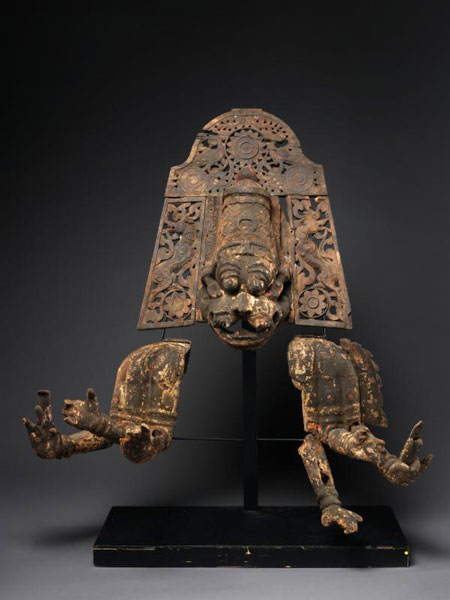The Metropolitan Museum of Art | 1000 5th Ave at 82nd Street | New York | NY | 10028
Dramatic Indian Sculptural Masks to be Featured in Exhibition on Theme of Vishnu at Metropolitan Museum
Exhibition dates: December 19, 2015–June 5, 2016
Exhibition location: Florence and Herbert Irving Asian Wing, third floor, Gallery 251Five rare wooden sculptural masks made in India—recently acquired by The Metropolitan Museum of Art—will be the highlighted works in the special exhibition Encountering Vishnu: The Lion Avatar in Indian Temple Drama, opening at the Met on December 19. Worn by actors in dramatic plays that were presented during religious festivals in southern India, the masks represent a largely unrecorded category of late medieval devotional art from India.
The appearances of Vishnu in many guises, known as avatars, are most famously celebrated in his Ten Avatars (Dasavatar). In this exhibition, Vishnu's Narasimha (man-lion) appearance will be celebrated with several dramatic sculptural depictions. They all explore the theme of Vishnu in his man-lion form, revealing himself at the court of an evil king in response to the king's attempts to slay his own son for his unwavering devotion (bhakti) to Vishnu. A frightful battle ensues in which Narasimha finally overcomes the protective magic that the evil King Hiranyanatakam surrounds himself with, and Narasimha disembowels the king. Order is thus restored to the universe.
Narasimha, South India (Tamil Nadu),
ca. 1700-1750. Wood with cloth and polychrome.
The Metropolitan Museum of Art, Purchase,
The Vincent Astor Foundation and Miriam and Ira D.
Wallach Foundation Gifts, 2015
This narrative is dramatically represented in sculptures and painting, and when staged it is given heightened drama by the wearing of these powerfully expressive masks. This temple drama, known as Hiranyanatakam, is still performed in the Kaveri delta region of Tamil Nadu, in villages around Thanjavur in southern India.
Along with the masks, the exhibition will present works in bronze, sandstone, and wood, as well as miniature paintings, lithographic devotional prints, and early photography, all of which illuminate the theme of Vishnu's divine appearances. Dating from the 6th to the 20th century, the 30 works will be drawn from the Met's collection, as well as private collections, and will include an extraordinary seated sandstone Narasimha from the sixth or seventh century.
The exhibition is made possible by The Miriam and Ira D. Wallach Foundation Fund.
The exhibition will be organized by John Guy, Florence and Herbert Irving Curator of the Arts of South and Southeast Asia.
|
Visitor Information Sunday-Thursday November-February (Admission at the main building includes same-week admission to The Cloisters) Adults $25.00, seniors (65 and over) $17.00, students $12.00 Members and children under 12 accompanied by an adult free Express admission may be purchased in advance at www.metmuseum.org/visit For More Information (212) 535 - 7710; www.metmuseum.org No extra charge for any exhibition. For more information; (212) 650-2010 or Cette adresse e-mail est protégée contre les robots spammeurs. Vous devez activer le JavaScript pour la visualiser.. |



